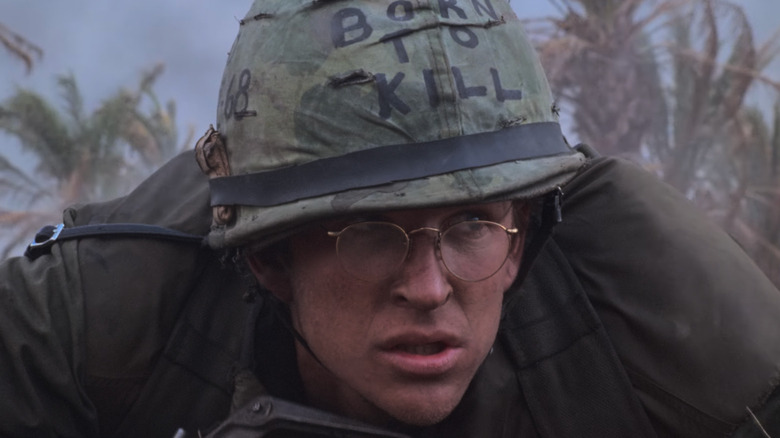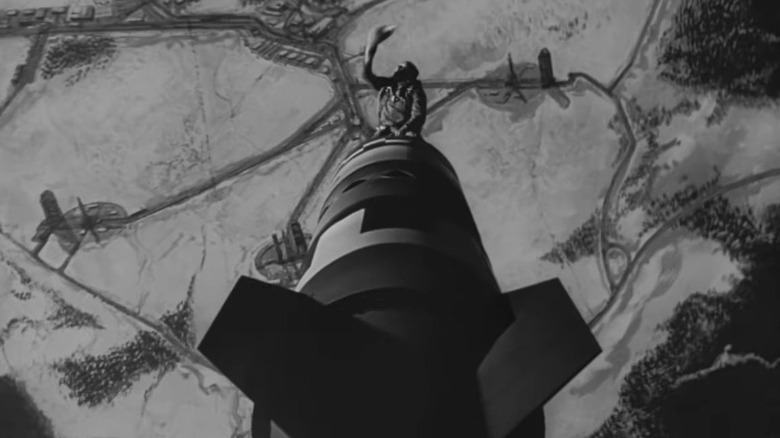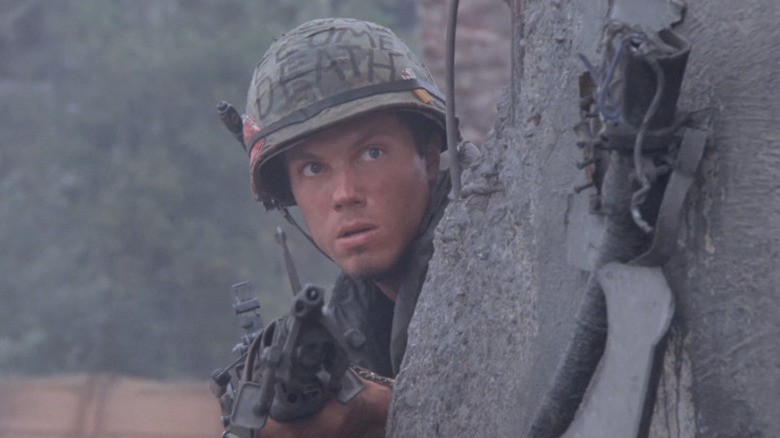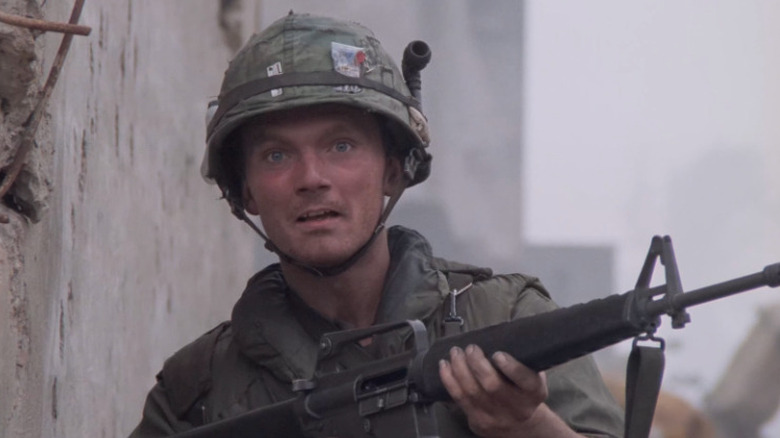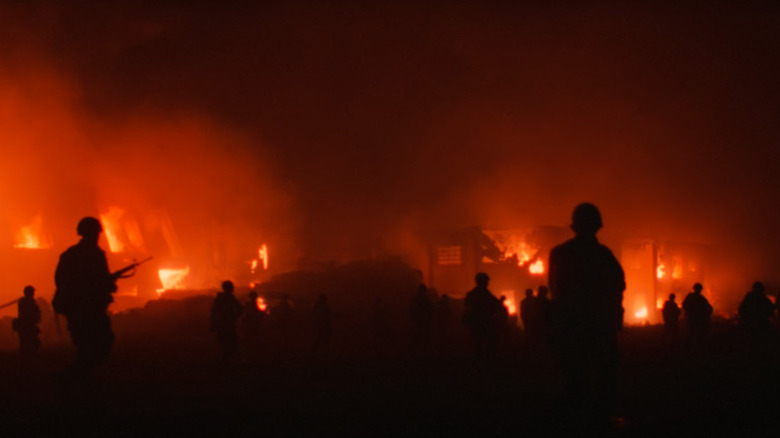How Stanley Kubrick Settled On Full Metal Jacket's Eclectic Soundtrack
War. Death. Existential annihilation. "Surfin' Bird" by The Trashmen. To some, one of these things is not like the other. To Stanley Kubrick, the director of the Oscar-nominated 1987 Vietnam War film "Full Metal Jacket," they are indelibly linked.
Critics were not all kind to Kubrick's second-to-last movie (his final film released before his death), with Roger Ebert calling the film "strangely shapeless" in his initial review, and "too little and too late" after other Vietnam War films had already made statements about the conflict.
But time has been kind to "Full Metal Jacket," and as is often the case in Kubrick films, the filmmaker's unusual music choices play a large part in shaping this allegedly "shapeless" picture.
Kubrick's ironic sonics
Stanley Kubrick's long, but not especially prolific career spans just thirteen films over nearly fifty years, three of which — his freshman efforts "Fear and Desire" and "Killer's Kiss," and his studio blockbuster "Spartacus" — the filmmaker effectively disowned. But many of his masterpieces (and all the others are arguably masterpieces) use music as a dramatic counterpoint to the action.
The 1964 Cold War comedy "Dr. Strangelove or: How I Learned to Stop Worrying and Love the Bomb," a film about the nuclear apocalypse, opens with an airy orchestral rendition of the 1932 love song "Try a Little Tenderness" while a plane refuels in midair, which Kubrick frames as a sexual allegory by emphasizing the insertion of a nozzle into a gas tank. The film ends with Vera Lynn crooning "We'll Meet Again" while atomic bombs obliterate the planet.
In the dystopian sci-fi drama "A Clockwork Orange," Kubrick staged a horrifying home invasion and sexual assault to the beloved musical number "Singin' in the Rain," sung by the assailant. In "2001: A Space Odyssey," classical music from Earth's past, like Richard Strauss's 1896 composition "Also sprach zarathustra," becomes the soundtrack to mankind's psychedelic journey into a high-minded, nearly unfathomable future.
Super Sounds of the '60s
But although the filmmaker had no compunctions against using seemingly inappropriate music to make a point he deemed appropriate, in "Full Metal Jacket," he did have a guideline: The songs in his movie had to be hits in the 1960s.
"It was the music of the period," Kubrick told Rolling Stone in a 1987 interview. "The Tet offensive was in '68. Unless we were careless, none of the music is post-'68."
"The music really depended on the scene," he continued. "We checked through Billboard's list of Top 100 hits for each year from 1962 to 1968. We were looking for interesting material that played well with a scene. We tried a lot of songs."
But although critics may love to discuss the subtextual underpinnings of the filmmaker's musical choices, his considerations were incredibly practical. "Sometimes the dynamic range of the music was too great," Kubrick added, "and we couldn't work in dialogue. The music has to come up under speech at some point, and if all you hear is the bass, it's not going to work in the context of the movie."
But Kubrick was also quick to point out that the "choices weren't arbitrary."
Don't you know about the bird?
"Full Metal Jacket" tells the story of J.T. "Joker" Davis, played by Matthew Modine, as he navigates a harrowing boot camp marred by violence and tragedy before entering the Vietnam War and finding the experience all the more jading.
One of the film's many scenes of violence is punctuated not by solemnity or silence, but by the sudden needle drop of the song "Surfin' Bird" by the Trashmen, one of the most absurdly chipper songs the director could have possibly chosen.
"What I love about the music in that scene," Kubrick explains in Rolling Stone, "is that it suggests postcombat euphoria — which you see in the marine's face when he fires at the men running out of the building: he misses the first four, waits a beat, then hits the next two. And that great look on his face, that look of euphoric pleasure, the pleasure one has read described in so many accounts of combat. So he's got this look on his face, and suddenly the music starts and the tanks are rolling and the marines are mopping up."
The club that's made for you and me
The ironic juxtaposition of cheerful music and tragic bloodshed would return at the end of "Full Metal Jacket," with the surviving soldiers droning an unsettlingly non sequitur rendition of "Mickey Mouse March," the theme song to the iconic children's TV series "The Mickey Mouse Club." Surely these young men drafted in the late 1960s would have been in the right age range to watch the show when it debuted in 1955.
It's worth noting that "Mickey Mouse March" didn't chart in the Billboard 100 between 1962 and 1968, which suggests Kubrick's criteria wasn't so much a rule as a guideline. But one song which did reach #2 on the charts in the United Kingdom in October of 1987 was a dance track entitled "Full Metal Jacket (I Wanna Be Your Drill Instructor)," featuring audio clips of the film's terrifying drill instructor, played by R. Lee Ermey, mixed to rap beats and electric guitars.
How's that for irony?
